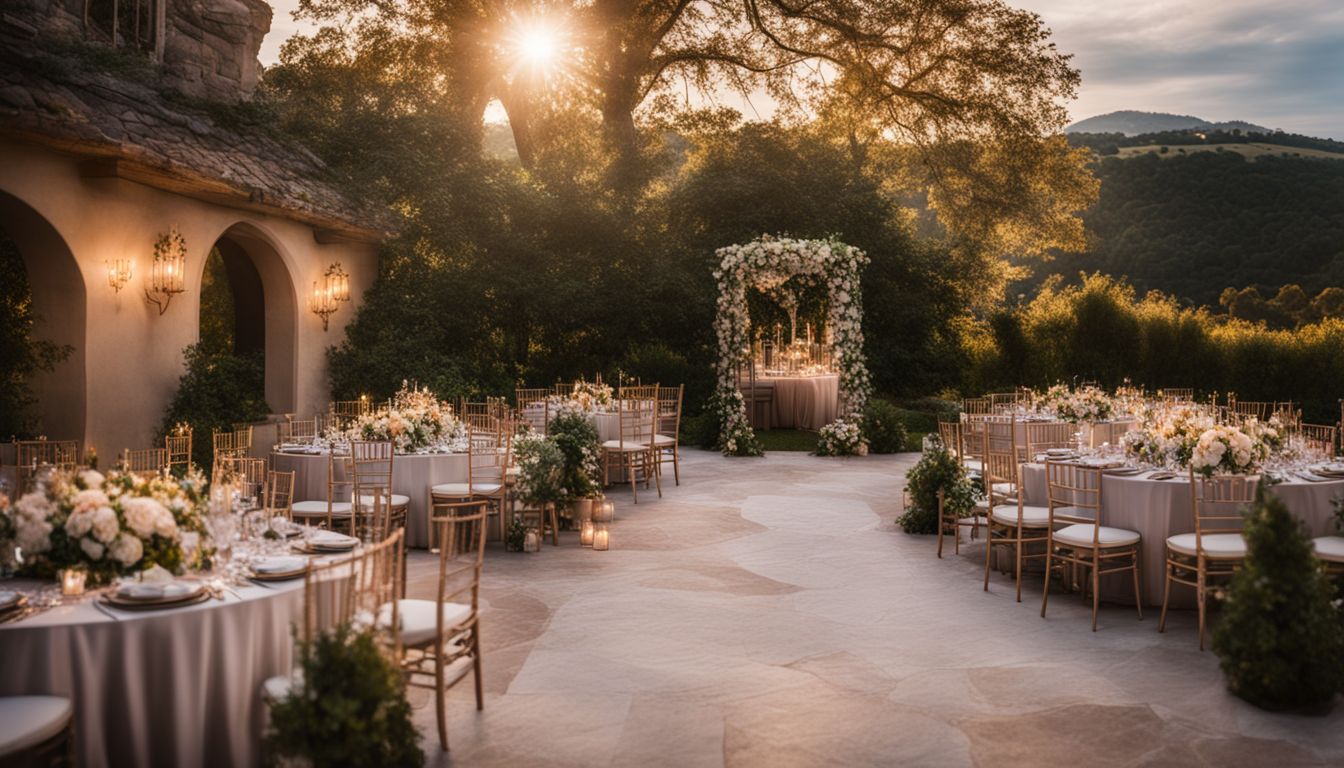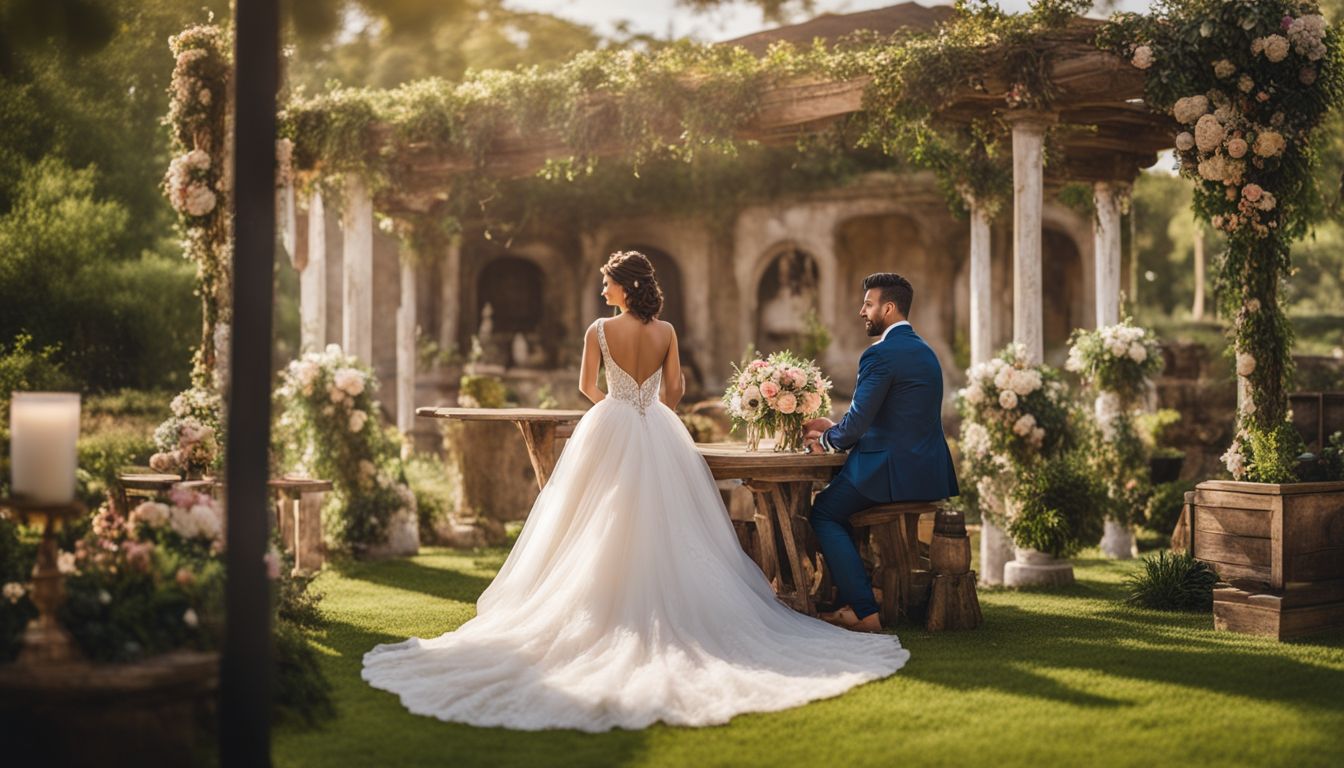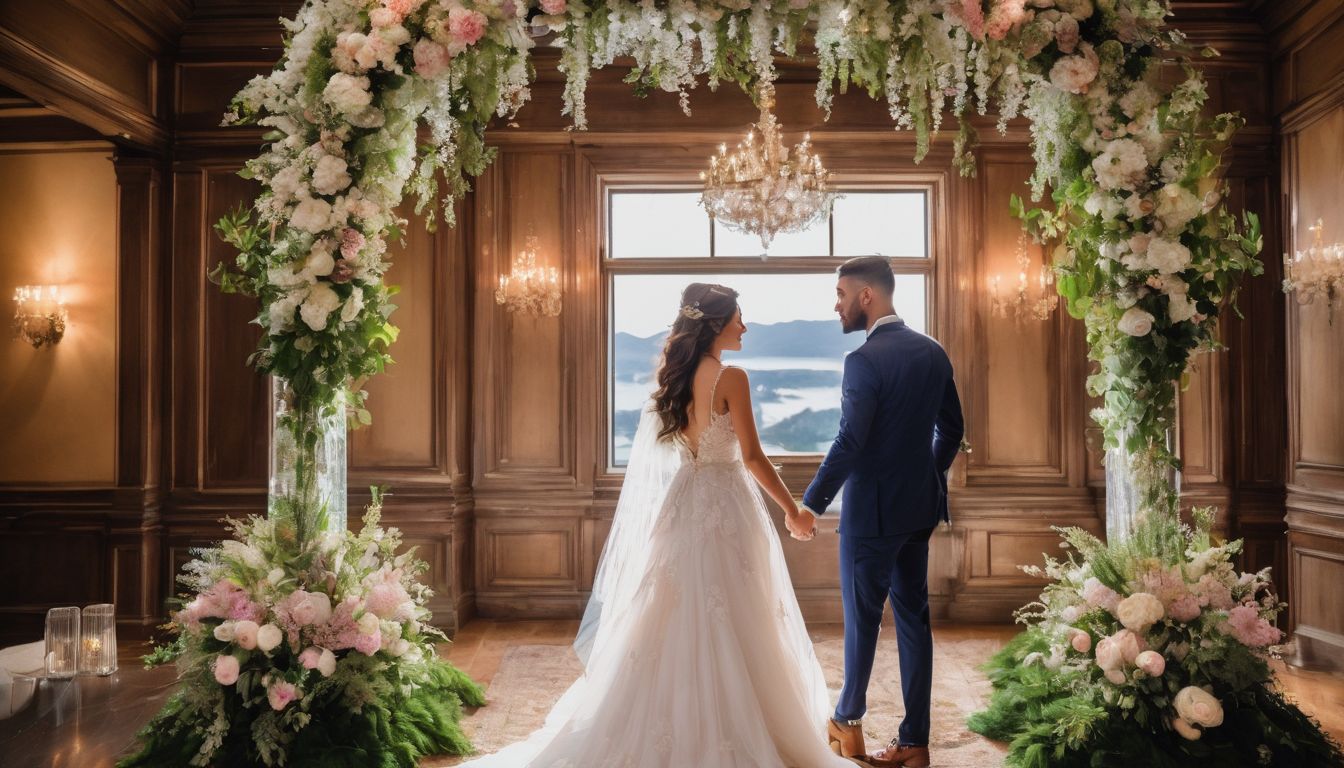Deciding on the right amount of wedding videography can be tricky. It’s a fact: most couples plan for 8 to 12 hours of video coverage to capture their special day fully. Our guide will dissect the essentials, helping you pin down just how much footage strikes the perfect chord for your wedding narrative.
Dive in, and let’s find your ideal match!
Key Takeaways
- Most couples plan for 8 to 12 hours of video to fully capture their wedding.
- The number of guests, venue, and ceremony length affect how much video time you need.
- Photographers often take 50 to 100 good pictures per hour of shooting at weddings.
- Talking to your videographer early helps make sure you get all the key moments filmed.
- Balancing what’s important with your budget is vital; around 10 – 15% of it usually goes towards photos and videos.
Determining Your Wedding Videography Needs

When it comes to determining your wedding videography needs, it’s important to start by drafting a detailed timeline of your wedding day and identifying the must-have moments you want captured on video.
Consider factors such as the size of your guest list, venue considerations, and the length of your wedding ceremony to help determine how many hours of coverage you’ll need.
Drafting Your Wedding Day Timeline
Creating your wedding day timeline is key. Your videographer will use it to plan their work.
- Start with getting ready: Capture the moments when you and your bridal party get dressed. This can take 1-2 hours.
- Consider first looks: If you’re having a ‘first look’ before the ceremony, add in 30 minutes. It’s special and needs time.
- Plan the ceremony: Religious rituals can last from 30 minutes to an hour. Make sure there’s enough time for the whole ritual.
- Include travel time: Going from one place to another takes time. Add this into your timeline.
- Cocktail hour is next: Guests enjoy drinks while you take photos. This usually lasts one hour.
- The reception follows: Entry, meal, speeches, first dance – all these big events happen now, lasting about 4 hours.
- Don’t forget cake cutting and dance floor action: These are must-have shots! They often happen after dinner.
- End with a grand exit: Sparklers or a car drive-away are great final shots to end with on film!
Identifying Wedding Coverage Must-Haves
Deciding what parts of your wedding you want filmed is key. Think about the moments that mean the most to you and your partner.
Factors Affecting Wedding Videography Hours

The size of the guest list, the venue considerations, and the length of the wedding ceremony can all significantly impact how many hours of video coverage you will need for your wedding.
These factors play a crucial role in determining the scope and duration of your videographer’s services. Understanding these elements will help you plan appropriately for capturing all the important moments on your special day.
Size of the Guest List
Having lots of friends and family at your wedding is wonderful, but a big guest list means your videographer will have more people to film. More guests usually lead to more special moments that you’ll want to remember forever.
Think about all the hugs, laughs, and dances; you don’t want to miss out on capturing those! That’s why it’s smart to use something like RSVPify’s calculator. It helps you guess how many people might come.
If your party is large, talk with your videographer early on. You need enough video coverage so not a single smile or silly dance move gets left out. Every person in the room adds life to your wedding video – from the little flower girl twirling in her dress to grandpa busting moves on the dance floor! Your video needs time to catch all these bits that make up your big day.
Venue Considerations
Picking the right place for your wedding is key. The venue changes how your video will look. Big or small spots, indoors or outdoors—they all make a difference. Think about light and sound as they can affect the video’s quality.
Your videographer should know when to start filming, especially if you’re getting ready in the same spot as where you say “I do.” They often begin 1.5 to 2 hours before the ceremony kicks off.
This gives them enough time to capture all special moments at your chosen place without rushing.
Wedding Ceremony Length
The wedding ceremony sets the tone for your whole day. It can be short and sweet or a bit longer, filled with songs, readings, and rituals. Think about what moments matter most to you.
Maybe you want every part of the story told, from walking down the aisle to saying “I do.”.
A quick ceremony might last 1-2 hours – perfect for catching just the key bits on camera. But if your dream is a grand event that moves from vows to dances at the reception, then hiring a videographer for 8 hours is wise.
They’ll catch all the laughs and tears without missing a beat. And if your celebration stretches into the night with lots of traditions and fun, plan for up to 12 hours of film time so nothing gets left out!
Understanding Videography and Photography Coverage
When planning for your wedding videography needs, it’s essential to understand the relationship between videography and photography coverage. This includes considering how many photos a photographer can take in an hour and how that aligns with the hours of video coverage you’ll need.
How Many Photos Can a Photographer Take an Hour??
A wedding photographer can snap a lot of photos in an hour. They usually take between 70 and 100 shots. This means they are always moving, looking for special moments during your big day.
They try to capture all the smiles, tears, and laughter.
From these pictures, the photographer will choose the best ones to give you. You’ll often receive around 50 to 100 great photos for each hour they’re taking pictures. These are the shots that tell your wedding story in a beautiful way.
Your wedding album will be full of memories because your photographer worked hard to get a lot of good photos.
Consulting Your Videographer
Talking to your videographer is key. They have the know-how to help you figure out how long they should be filming on your big day. You might think eight hours will cut it, but they can tell you if that’s enough for what you want captured.
It’s smart to get both your photographer and videographer talking early on. This way, they can plan together and make sure they give you the best coverage of both videos and photos.
Make sure to ask them about their experience with wedding parties and receptions too. They could give you tips on what moments are important not to miss. Also discuss cost versus wants so you strike a balance between the two without breaking the bank or missing out on capturing key memories.
Balancing Importance and Budget
It’s essential to balance the importance of capturing precious wedding moments with the budget available. Prioritise what aspects matter most and allocate resources accordingly. Discuss openly with your partner about wedding expenses; a joint decision-making approach ensures shared responsibility and reduces financial stress.
When planning a wedding, spread out the budget wisely to ensure sufficient coverage without overspending. Understand that spending significantly on hiring a photographer or videographer is crucial for preserving lasting memories, but ensuring financial stability post-wedding is equally important.
Consider using simple maths tricks to make wedding budgeting work effectively. For instance, setting aside 10-15% of the total budget for photography and videography can help in practical allocation while avoiding going overboard financially.
Moreover, aim for realistic and workable budgets; avoid excessive debt by prioritising necessities over luxuries during the planning process. Remember that establishing open communication channels regarding finances early on sets a positive tone for future discussions and decisions throughout married life.
Conclusion
In conclusion, determining the hours of video needed for a wedding is influenced by various factors. Couples should consider their priorities and what moments they want to capture when deciding on the amount of videography coverage required.
Consulting with a professional videographer can provide valuable insight into tailoring coverage to fit specific preferences and budget. By understanding these considerations, couples can make informed decisions to ensure their special day is beautifully documented.
FAQs
1. How long should a wedding videographer be at my wedding?
A wedding videographer usually stays to capture all the key moments, from the ceremony to the reception. This often means being present for about 8-10 hours.
2. Is it important to film both the wedding party and reception?
Absolutely – filming both gives you a complete memory of your day! The time with your wedding party sets the scene, while capturing the reception ensures you remember all celebrations that follow.
3. Can I choose fewer hours of video coverage for my wedding?
Yes, some couples opt for less coverage—maybe just the ceremony or part of the reception—but talk with your videographer first; they’ll guide you on what can be captured in that timeframe.
4. What if my wedding goes longer than expected? Will videographers stay extra time?
Discuss this with your chosen professional before your big day—they may offer additional hours at an extra cost if needed to ensure none of those special moments are missed.






